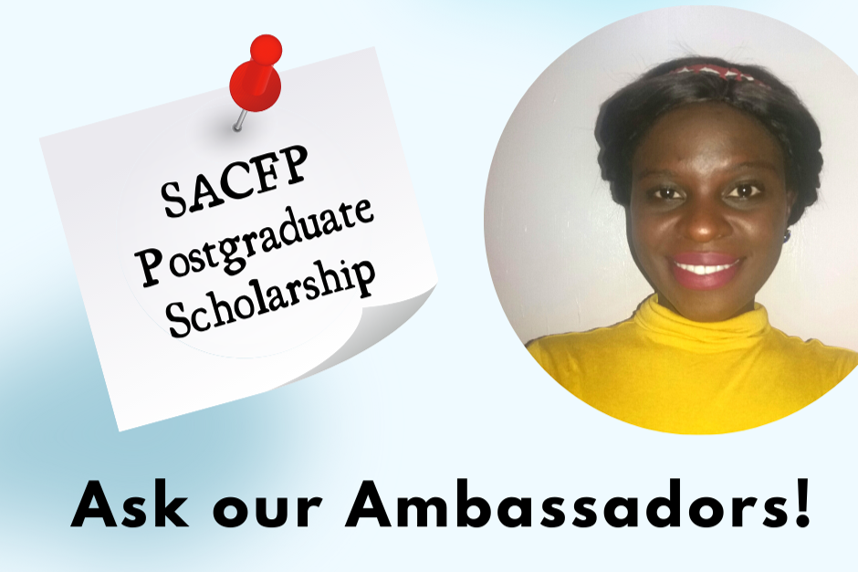By Olga Mapanje

In our new ‘Ambassador Advice’ series, our Africademics Scholarship Ambassadors share their experience and advice for scholarship applicants in and from Africa. This week Olga Mapanje from Zimbabwe, a PhD student at the University of Pretoria and recipient of the SACFP ‘Catalyzing Climate Finance for the Southern African Development Community’ Postgraduate Scholarship, introduces the programme and shares valuable tips for future applicants.
About the Scholarship
In November 2020, I came across an advert for a postgraduate scholarship programme titled ‘Catalyzing Climate Finance for the Southern African Development Community’. It is a programme carried out by the Southern Africa Climate Finance Partnership (SACFP). Coordinated by the SouthSouthNorth (SSN), a South African -ased organisation, and funded by the International Development Research Centre (IDRC), the SACFP is a multi-country, knowledge- sharing and capacity enhancement platform for southern African countries seeking to access catalytic sources of international climate finance in order to mobilise investments into low-emissions, climate resilient development in the region.
The SACFP was formed in 2016, and the scholarship programme is being offered for the first time for the period between 2021 and 2023. In 2020, the SACFP was offering postgraduate scholarships to four postgraduate scholars (3 M.Sc. and 1 Ph.D students.), to undertake research based degrees focused on climate finance. The scholarship programme fully covers both tuition fees and the living expenses for the funded students.
Eligibility and Application
The programme is open to candidates who have already secured admission for their postgraduate studies for the 2021/2022 academic year, prior to applying for the scholarship. No specifications were mentioned concerning the university to which the postgraduate students were to be registered, but preference was given to candidates from the SADC region.
The programme also required that the funded candidates develop thesis topics that are related to climate finance and they would be supervised by the SACFP Principal Investigator, in addition to an academic supervisor from the university. It was open to candidates who had completed their B.Sc. / M.Sc. degrees in fields such as Economics, Finance, Geography, Natural Resources Management and Development Studies within the last 5 years.
In application for the programme, candidates were required to complete a google form which had a few questions on the topic of climate finance. In addition to that, they were also supposed to submit CVs which showed previous research experience, motivation letters explaining their research interests and why they wanted to join the programme, two reference letters and a writing sample via the google form.
Personal Experience and Advice
I applied for this scholarship programme because I already had previously been admitted for a Ph.D. programme at the University of Pretoria, and so I was in the process of seeking financial aid. Moreover, I personally have passion and interest towards climate change related research; therefore, my research interests were in line with the call.
I personally did not encounter any significant challenges throughout the application process. I had to do a minor research though, in order to answer the few questions on climate finance on the google form, and as someone who already has interest in climate related research it was not challenging but interesting rather.
From this, I have learnt that alignment is very important in life, especially if you are an academic. I am an Agricultural Economist and have been involved in climate change related research for the past few years so much that I did not have to struggle in explaining why I needed to join the programme, in the motivation letter. Moreover, my referees also did not have to lie about my research experience in the recommendation letters that they wrote on my behalf to support the application.
I submitted the application in November 2020, and in December I was shortlisted as a potential candidate for the Ph.D. scholarship. The interviews were conducted virtually in January 2021, and by the end of January I had received the great news that I got the scholarship.
From this programme I look forward to not only receiving financial aid, but also guidance, mentorship and more networking opportunities, as I work with the Principal Investigator from the SACFP on the topic of climate finance. I also look forward to attending climate finance webinars, workshops and conferences that will help in building my research skills in this field, and I believe that at the end of my Ph.D. journey I will be graduating as an expert in climate finance.
Unfunded research is very difficult to carry out and the researcher’s ability to maximize his/ her potentials may be limited as a result of lack of funds. I therefore encourage postgraduate researchers/ students to seek and apply for opportunities like this.
I also encourage scholars to subscribe to the Africademics weekly newsletter via email, and follow the Africademics page on all social media platforms to fully access different funding opportunities that may help in smoothening their academic journeys.
